It doesn’t take a guitar expert to understand that the Gibson Les Paul is one of the most iconic musical instruments ever made. Not only has it left its mark on music, but also on pop culture in general. One of the biggest barriers to ownership of a Gibson Les Paul, though, is price, and that’s why so many guitarists find themselves searching for the best cheap option.
The Les Paul’s popularity has resulted in vast numbers of tributes and even flat out copies from other brands, as well as authentic versions made under license by the likes of Epiphone. With so many Les Pauls and Les Paul style guitars on the market, there’s never been a better time to look for a budget Les Paul!
In this KillerGuitarRigs Review, we’ll be showing you the best affordable Les Pauls available today. During the reviews, we focused on tone, playability, consistency, and build quality. To make sure that everything was covered on a level playing field, we used the same Marshall DSL40CR amp throughout.
If you’re in the market for a bargain Les Paul, you won’t want to miss this!
Read more about our review process.
Contents
Our Top Picks
The Epiphone Les Paul Junior is our Top Pick for this article. With a resonant mahogany body, warm tone, and authentic feel, you get a real Les Paul that is also lightweight, at only 7 lbs.
Guitarists looking for a Les Paul at a rock bottom price should check out our Best Budget option, the Jackson Monarkh SC JS22. With a nato body, contoured edges, and a couple of Jackson High output Humbuckers, this guitar is a good choice for metal and other high-gain genres.
If you want a quality Les Paul, and you’re willing to spend a little more, take a look at our Editor’s Choice, the Epiphone Les Paul Studio. This guitar features a lightweight mahogany body and Alnico Classic Humbuckers that deliver that punchy and fat tone that makes Les Pauls so special. For the money, this is the closest you’ll get to the real thing!
Individual Reviews
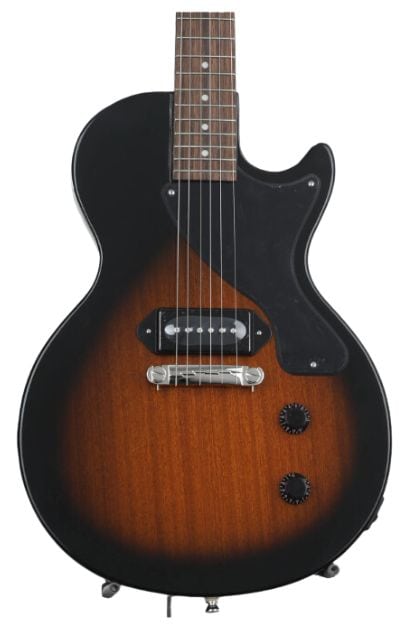
Epiphone Les Paul Junior
An affordable take on the original student model.
This lightweight, student grade Les Paul comes in at about a third of the price of its Gibson equivalent, and offers borderline identical construction and features. It’s a phenomenal player, with fantastic tone, and amazing versatility for a guitar equipped with just one pickup.
This Epiphone Les Paul Junior featured a gorgeous mahogany body and came finished in a stunning Tobacco Burst. It differed a little from the original in that it had a PU topcoat rather than nitro, but beside that, it would take a detective to tell the two apart.
We got a fat, warm sound from the first clean chord we strummed, and we found ourselves impressed by the genuine Les Paul feel. Besides the great tone and feel of this instrument, we were surprised by how light it was, at just 7 lbs, which is relatively low for a Les Paul. Of course, the weight savings were largely down to the lack of a maple cap and the simple slab style body.
With a single P-90 PRO Dogear Single-coil pickup in the bridge position, our open clean chords and lines had a nice bite. With great note definition and crisp tone across the entire fretboard, we loved this tone for everything from clean blues solos all the way to accompaniments in a singer-songwriter style.
Once we cranked up the gain on the amp, we got a punchy tone on our power chords and riffs, with a nice midrange for cutting across a busy live band mix. We also liked the tone of this P-90 bridge pickup for leads, as it gave us not only a powerful tone but also a nice and natural sustain. With the gain maxed and the tubes fully saturated, we got a ton of the signature P90 growl that has made the LP Jr so popular with punk players for so long.
This Epiphone Les Paul felt as good as it sounded. It came with a Vintage ’50s neck that nicely filled out our hands. Yes, it was thick, but it felt fantastic for both chords and leads. We felt right at home with this guitar’s mahogany neck and responsive Indian laurel fingerboard. With a comfortable 12-inch radius and the typical Gibson 24.75″ scale length, this guitar delivered fantastic feel and playability.
Verdict: The Epiphone Les Paul Junior delivers an authentic Les Paul tone thanks to its resonant mahogany body and punchy P-90 pickup in the bridge position. Lightweight and comfortable, we also got a great playing experience with a true Gibson neck and responsive fingerboard that felt great for everything from heavy riffs to delicate single lines.
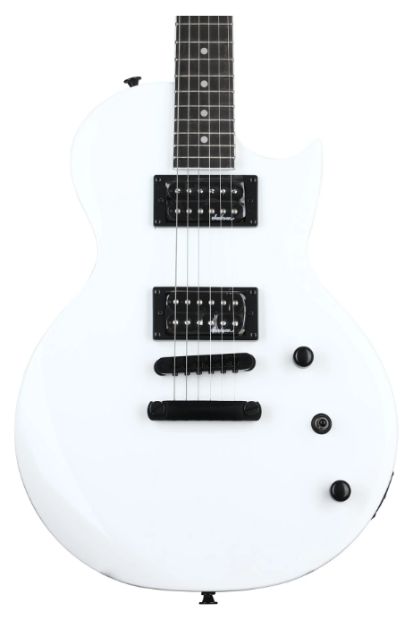
Jackson Monarkh SC JS22
A fast-playing Les Paul at a price you wouldn’t believe.
Jackson is known for producing quality instruments for all types of players. The Monarkh SC JS22 is their take on a Les Paul, but with a faster playing neck that is great for metal and similar styles, as is commonplace with many of this company's guitars.
The Jackson Monarkh SC JS22 featured a nato body with contoured edges and a pair of Jackson High output Humbuckers. The inclusion of these high-output ceramic pickups, as well as the compound radius, suggest that Jackson intended to gear this guitar for metal and similar high-gain guitarists.
We started our tests with the bridge pickup. We got a powerful punch with clarity while playing with our fuzz pedal, ideal for aggressive styles of music. We got a really well balanced frequency response, which we found ideal for both heavy riffs and lead lines. This pickup also sounded good for cleans, with a forward tone that paired well with our reverb and delay pedals.
Moving on to the neck pickup, we got a rounder tone that was still capable of being aggressive when pushed. We liked this pickup best with our Ibanez Tube Screamer, and the tone knob rolled all the way up. The high output tone that the neck pickup provided was good for different styles of rock, and even a bit of distorted blues.
The Jackson Monarkh SC JS22 delivered good playability and in typical Jackson style, allowed us to play fast. It had a compound-radius fretboard that went from 12″ to 16″, and we got a nice response from the Amaranth fretboard. This type of playability is great for metal, as the rounder nature of the neck at the nut made it easier for us to play chords and riffs, while the more flattened surface at the higher frets allowed us to play faster licks and scales.
Another nice feature on this Les Paul copy was the Jackson Tune-O-Matic Adjustable with Anchored Tailpiece. It gave us good tuning stability, and accurate intonation.
Verdict: The Jackson Monarkh SC JS22 gave us a good high-output tone and fast playability, making it a good choice for metal players. With a pair of Jackson High output Humbuckers and a compound radius, this guitar provides a good distorted tone and nice comfort for both chords and blazing scales and leads.
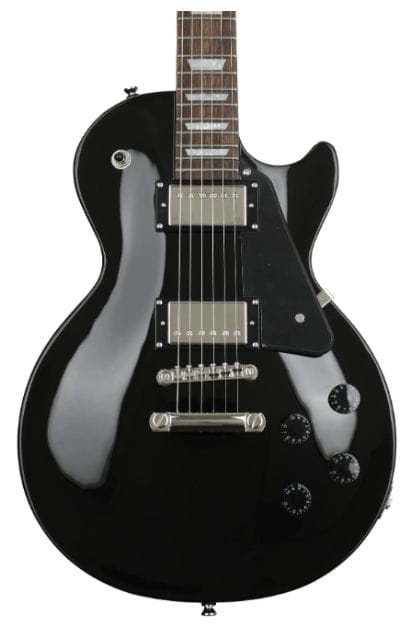
Epiphone Les Paul Studio
An ideal choice for the savvy Les Paul shopper.
This guitar offers the sound and playability that Les Pauls are renowned for but at a fraction of the cost. Besides tone, feel, and looks, this Epiphone Les Paul also features useful tools like push-pull volume pots for coil splitting, for even greater flexibility.
This Epiphone Les Paul Studio came with a mahogany body topped with a maple cap for an authentic LP playing experience. With a beautiful Ebony color and a gloss finish, this Les Paul certainly delivered in the looks department.
We started with the Epiphone Alnico Classic Humbucker at the bridge. With a bit of overdrive dialed in, we got a trebly bite that was penetrating, partially thanks to the maple top combined with the depth of the mahogany body. With more aggressive distortion, we got great punch and sustain, a perfect sound for our lead and rhythm parts.
On the other hand, the Epiphone Alnico Classic Humbucker in the neck position gave us a much warmer, bluesier tone. This was perfect for darker riffs with high gain distortion as well as lyrical lead with overdrive. We even liked this pickup for a bit of jazz playing, especially with the tone knob rolled back a bit.
We also liked the flexibility of having single coil tones on both the neck and bridge pickup. The push-pull pots felt good and durable and added another sound that can be used for genres such as rock and blues, adding nice versatility to this Les Paul.
This Epiphone Les Paul also felt great in our hands. The 1960s SlimTaper D neck profile was comfortable and gave us a great Gibson feel. We also loved how the Pau Ferro fingerboard felt, as well as the traditional 24.75″ scale length with a 12″ radius. This neck gave us a fantastic feel for expressive blues and rock solos, and also felt wonderful while playing different types of chords all over the neck.
This Epiphone Les Paul Studio also gave us good tuning stability, thanks to its Tune-o-matic bridge, and Grover style Wilkinson tuners. Intonation was also accurate from top to bottom.
Verdict: The Epiphone Les Paul Studio gave us that sought-after tone and sustain but at a more manageable weight and price. This guitar is a terrific choice for guitarists looking to get close to a Les Paul tone and feel but at a bargain price.
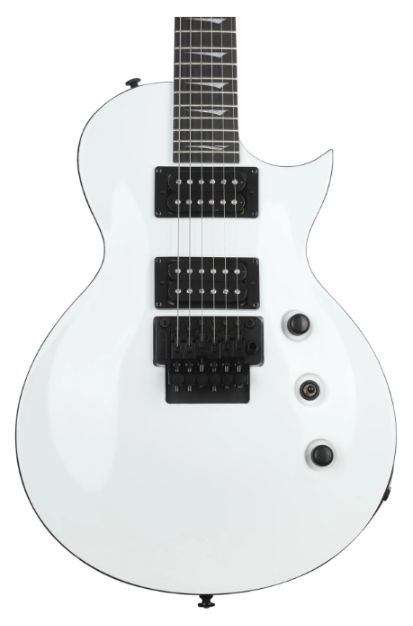
Kramer Assault 220
Versatile tone on two Alnico V humbuckers.
Although this Kramer guitar is a Les Paul copy, it comes with two features that are not commonly associated with this legendary guitar. The first one is a Floyd Rose tremolo (as opposed to a fixed bridge) and the second is the push-pull mechanism that allows you to have single coil tones.
One thing you may not know about Kramer is that it is actually a Gibson brand, which means the dimensions were a lot closer to an actual Les Paul than we found with the other non-Epiphone brands.
The Kramer Assault 220 came with a mahogany body with carves for enhancing the guitarists’ comfort. Both the neck and bridge pickups were Alnico V Humbuckers, with a push-pull knob for selecting series or parallel operation.
We began by testing the bridge pickup on clean, where we got a bitey tone that paired well with our modulation and space pedals. This tone was good for blues and clean rock parts, for both chords and single lines.
With the gain cranked, this pickup gave us some powerful distortion and nice sustain – a tone we found perfect for hard rock, metal, and other similar uses. We especially liked it with some delay and reverb, particularly for solos and single-line parts.
Moving on to the neck pickup, we got a darker tone that was still good for rock when overdriven. Distorted leads sounded fantastic, too, especially with a bit of ambiance, and this pickup really took pedals well. We did find it to be a bit dull for clean tones, but then again most people aren’t buying a Kramer Assault to play Jazz!
We also enjoyed the comfortable playability of the Kramer Assault 220, especially for metal and similar genres. The Speed SlimTaper C mahogany neck allowed us to play fast runs comfortably. We also liked the feel of the Ebony fingerboard, a common choice for far pricier Les Pauls models.
One of our favorite features on this guitar was the Floyd Rose Locking Tremolo. Although Les Pauls typically come with a fixed bridge, being able to perform dive bombs while having the warm tone and feel of this type of guitar was really unique. This particular feature is yet another reason why this Krammer is a good choice for metal guitarists.
Verdict: The Kramer Assault 220 delivers a muscular distorted tone thanks to the Alnico V Humbuckers and resonant mahogany body. With a Floyd Rose tremolo and the ability to set the pickups in series or parallel mode, this guitar offers great versatility for the metal player that is looking for a fast neck and powerful tone.
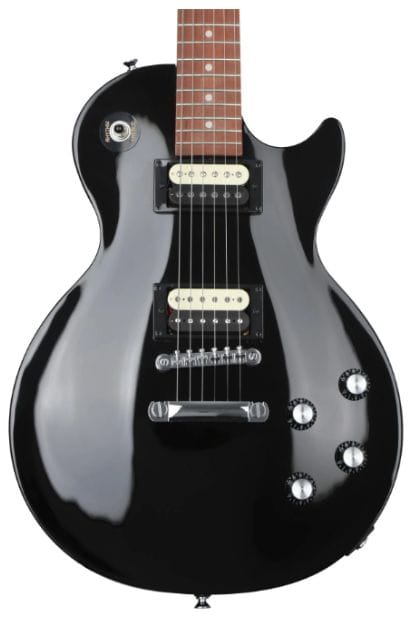
Epiphone Les Paul Studio E1
A super affordable Les Paul for beginners.
This is a great choice if you like Les Pauls and want to start learning the guitar but you’re trying to keep costs down. With great tones, excellent build quality, and authentic Les Paul looks and feel, the Studio E1 delivers on looks, as well as feel and overall tone.
The Epiphone Les Paul Studio E1, like any good LP, was built with a mahogany body in order to deliver that iconic resonance. Further helping the tone was a pair of ceramic humbucking pickups. We started our tests by trying out the 700T Zebra Humbucker in the bridge position with fuzz and distortion pedals.
This pickup gave us powerful distortion that was devoid of any hum or unwanted noises, and for a budget unit, delivered surprising clarity, too. With the treble knob rolled all the way up, we got a punchy and penetrating growl that was great for rock and blues. Our power chords had good definition, and our lead served up a healthy dose of sustain.
Played clean, the bridge humbucker had a forward tone with tons of mid range presence. It was good for open chords and the occasional single line for clean blues. We liked it best with the tone knob at about the midway point, as it gave us a tone that can stand out in a busy live mix.
On the other hand, the 650R Zebra Ceramic Humbucker in the neck position gave us a rounder tone. We liked how it sounded best when overdriven especially for riffs that had a bit of a darker tinge to them. Leads also had a nice sustain with a warmer tone, and we especially liked our single lines with a bit of overdrive on this neck humbucker pickup. That said, we felt that the clean tone on this pickup was a bit unclear and muddy.
Regarding playability, the Epiphone Les Paul Studio E1 felt much like a Gibson Les Paul would, with its 60’s SlimTaper, D profile neck, and rosewood fretboard. This guitar gave us an authentic Les Paul playing experience, and we enjoyed how the rosewood fretboard responded to our fingers. With a traditional scale length of 24.75″, nut width of 1.6875″, and 22 medium jumbo frets, this Les Paul felt really good in our hands.
The tuning and intonation on this guitar were good, especially considering its low price. It came with a LockTone Tune-O-Matic Bridge with Stopbar Tailpiece, in keeping with the Les Paul tradition of using fixed bridges, which usually aids tuning, especially with guitars at this price range.
Verdict: The Epiphone Les Paul Studio E1 comes with a resonant mahogany and a pair of Zebra Ceramic Humbuckers in order to deliver a punchy distorted tone on both the neck and bridge positions. The neck on this Les Paul provides a nice playing experience, with traditional appointments that felt good and familiar in our hands.
How to Choose the Right LP For You
Les Paul guitars are iconic instruments, and are renowned for their fat tones and distinctive design. With time, their popularity has skyrocketed, in great part because high-profile players such as Slash use this guitar almost exclusively.
As a result, the original Gibson Les Paul models can be quite expensive, and in the case of vintage models, can reach into the hundreds of thousands of dollars. The good news is that there are plenty of affordable alternatives available in the form of Les Paul guitar copies. Below we’ve shared a few pointers that will help you pick the best budget Les Paul for you.
Opt for an Established Brand
Start your search by exploring reputable brands known for producing quality Les Paul guitar copies at affordable prices. Epiphone, Kramer, and Jackson are among the top brands with a well-established history of delivering solid instruments that emulate the Les Paul sound and feel. While there are some great examples from the likes of Firefly and Grote sold through outlets like Amazon, it can be easy to end up with a lemon if you don’t know what you’re looking for.
Budget
Budget is a crucial aspect to take into consideration. The best thing to do is to set a clear budget. That way you narrow down your options and avoid overspending. Les Paul copies can range from budget-friendly entry-level models to mid-range options, so knowing your budget will guide your decision-making process.
Playability
The playability and comfort of the instrument are top considerations when buying a Les Paul copy. Take into account which neck profile you prefer, as this significantly impacts playability. Decide whether you prefer a slim or thicker neck profile, and also take into consideration the action that fits your playing style. As a general rule, lower actions are more comfortable, and easier to play, but can result in unwanted fret buzz..
Weight
Les Paul guitars are notorious for being heavier due to their solid mahogany and maple body construction. Consider the weight of the instrument and determine if it suits your playing comfort, especially if you plan on performing for extended periods, or already have back problems. If you’re interested in a lighter model, look for a slab style guitar, or one without the maple cap.
Tonewoods
Les Paul guitars generally utilize a variety of tonewoods in their construction to achieve their characteristic sound and feel. For instance, mahogany is a popular choice for both the body and neck of Les Paul guitars. It provides a warm, rich tone with good sustain and resonance.
On the other hand, some Les Paul guitars come with a maple top, adding brightness, clarity, and snap to the overall tone. This tonewood choice can also enhance the guitar’s aesthetic appeal with its beautiful grain patterns.
Another common tonewood for Les Pauls is rosewood, often used for the fingerboard. It offers a smooth feel and contributes to a warm, well-rounded tone. Rosewood helps enhance sustain and adds complexity to the guitar’s sound.
Ebony is yet another tonewood use for these guitars and is particularly found on higher-end Les Paul models, especially for the fingerboard. Ebony is a dense and smooth wood that provides a bright, articulate tone with excellent note definition. It offers a slick playing surface, ideal for fast and precise playing styles.
Final Thoughts
Les Pauls are arguably at the height of their popularity, thanks in part to the popularity of vintage models. These guitars offer fat tones and a type of feel and playability that many rock and blues players love. However, original Les Paul models are very expensive, to the point that they are cost-prohibitive for many guitarists.
Luckily, there are a vast amount of quality and affordable Les Pauls available in the market today. These come at different prices and with different features, in order to suit the preference and playing style of each individual.
To recap our choices, the Epiphone Les Paul Junior is our Top Pick. This guitar features a resonant mahogany body, which gives it its warm tone, and authentic Les Paul feel while being comfortably lightweight, at only 7 lbs.
If you are a metal guitarist looking for a good Les Paul at an exceptionally affordable price, take a look at our Best Budget option, the Jackson Monarkh SC JS22. With a nato body featuring contoured edges, and a couple of Jackson High output Humbuckers, this guitar delivers powerful distorted tone and is a good choice for high-gain genres.
Finally, if you are looking for a Les Paul that is still affordable but with better quality than most, take a look at our Editor’s Choice, the Epiphone Les Paul Studio. This guitar comes with a lightweight mahogany body and Alnico Classic Humbuckers that offer that punchy and fat sound that we’ve come to associate with Les Paul guitars.


